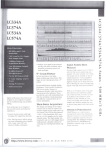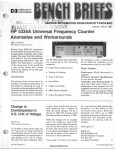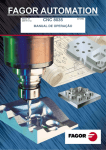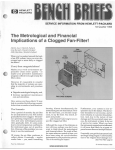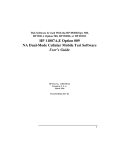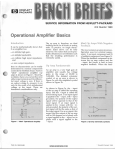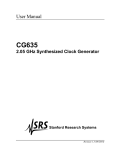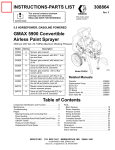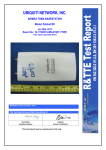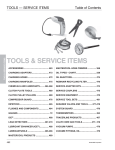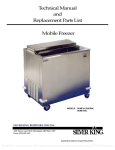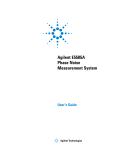Download "service manual"
Transcript
SERVICE INFORMATION FROM HEWLET-PACKARD 1st Quarter 1994 The Optical Spectrum Analyzer Sensitivity ;' = Part 3 Mike LevernierlHmlett-Packard tical spectrum analyzers, see the previous issue of Bench Briefs.) Figure 1 shows the display of a signal that has an amplitude equal to the sensitivity setting of the optical spectrumanalyzer. r Introduction In the previous issue of Bench Briefs Richard Ogg explained the optical spectrum analyzer in terms of signal processing, various operating modes, noise generation, and the control of noise through filtering schemes. In this issue, Mike Levemier describes OSA sensitivity through HewlettPackard's patented way of allowing the user to directly enter the required sensitivity level - what HP calls a "sensitivity function." For more detailed information on optical spectrum analysis basics, order Application Note 1550-4, Optical Spectrum Analysis, HP Pub. No. 5091-3054E from your local HP sales/serviceoffice. Single monochromators typically have sensitivity about 10 to 15 dB better than that of double monochromators due to the additional loss of the second diffraction grating in double monochromators. The double-pass monochromator has the same high sensitivity of single monochromators even though the light strikes the diffraction grating twice. The high sensitivity is made possible by the halfwave plate and the use of a smaller photodetector that has a lower noise equivalent power (NEP). I 1 c- Sensitivity is defined as the minimum detectable signal or, more specifically, six times the rms noise level of the instrument. Sensitivity is not specified as the average noise level, as it is for RF and microwave spectrum analyzers, because the average noise level of optical spectrum analyzers is 0 watts (or minues infinity dBm). (For more information on the differences between electrical and opPub. No. 5952-3465 Tuning Speed Sensitivity can be set directly on Hewlett-Packard optical spectrum analyzers, which then automatically adjust to optimize the sweep time, while maintaining the desired sen- Sensitivity - Directly Settable by the User '1 sitivity. Sensitivity is coupled directly to video bandwidth, as shown in Figure 2. As the sensitivity level is lowered, the video bandwidth is decreased (or the transimpedance amplifier gain is increased), which results in a longer sweep time, since the sweep time is inversely proportional to the video bandwidth. The sweep time can be optimized because the video bandwidth is continuously variable and just enough video filtering can be performed. This avoids the problem of small increases in sensitivity causing large increases in sweep time, which can occur when only a few video bandwidths are available in fairly large steps. Sweep-Time Limits For fast sweeps, sweep time is limited by the maximum tuning rate of the monochromator. The direct-drive- %!-38 08 dBn Sensitivity = -80 dBm- RB E 1 nn UE 208 H z S SI-950 i ~ e c Figure 1. Display of signal with amplitude equal to sensitivity level. WWW.HPARCHIVE.COM 0 1994 Hewlett-Packard SENS - 8 2 dBm 5.00 d8lOlU Video BW 300 Hz- S T R R T 1 1 5 0 . 0 nm * R E 1 nm x U B 3 8 HZ S S T O P 1 1 5 0 . 0 nn * S T 18 s e c Figure 2. Video bandwidth directly affects sensitivity. motor system allows faster sweep rates when compared with optical spectrum analyzers that use gear-reduction systems to rotate the diffraction grating. For high-sensitivity sweeps that tend to be slower, the small photodetector and continuously variable digital video bandwidths allow faster sweep times. The small photodetector reduces the sweep time because it has a lower NEP than the large photodetectors used in other optical spectrum analyzers. Lower NEP means that for a given sensitivity level, a wider video bandwidth can be used, which results in a faster sweep. (Sweep time is inversely proportional to the video bandwidth for a given span and resolution bandwidth.) The continuously variable digital video bandwidths improve the sweep time for high-sensitivity sweeps in two ways. First, the implementation of digital video filtering is faster than the response time required by narrow analog filters during autoranging. Second, since the video bandwidth can be selected with great resolution, just enough video filtering can be used, resulting in no unnecessary sweep-time penalty due to using a narrower video bandwidth than is required. Figure 3 shows a 20 second filter-response measurement. This filter, for an erbium amplifier, was stimulated by a white-light source and the figure shows the normalized 2 BENCH BRIEFS Figure 3. Improved sweep times, even for high sensitivity measurements that traditionally result in slow sweeps. This plot shows the normalizedoutput of an erbium amplifier filter that was stimulated by a white-light source. response. The purpose of this filter is to attenuate light at the pump wavelength, while passing the amplified laser output of 1550 nm. Due to the low power level of white-light sources, this measurement requires great sensitivity, which traditionally has resulted in long sweep times. changed to reposition the signal in the measurement range of the analyzer's internal circuitry, and the sweep continues. This repositioning explains the pause that can occasionally be seen in a sweep with a wide measurement range. Autoranging Mode Autoranging mode is activated automatically for sweeps with amplitude ranges greater than about 50 dB. The amplitude range is determined by the top of the screen and the sensitivity level set by the user. With the autoranging mode activated, when the signal amplitude crosses a threshold level, the sweep pauses, the transimpedance amplifier's gain is Chopper Mode The main purpose of the chopper mode is to provide stable sensitivity levels for long sweep times, which could otherwise be affected by drift of the electronic circuitry. The desired stability is achieved by automatically chopping the light to stabilize electronic drift in sweeps of 40 seconds or greater. The effect is to sample the noise and stray light before each trace point and subtract them from the "1 (See 'optical Spectrum Analyzer," page 8) - Non-Chopper Mode Chopper Mode (ST = 41 Sec) Figure 4. Dynamic range improvement from chopper mode. WWW.HPARCHIVE.COM 1ST QUARTER 1994 1 1994 Logistics Data Book tract numbers for provisioned products, and recommends replacements for discontinued products. The companion microfiche lists NSNs for product components and can be requested with postage-paid cards included in the data books. John CloutierIHmlett-Packard If your work requires U.S. Government National Stock Numbers (NSNs) for HP products and their components, HP’s annual Logistic Data Book and its companion microfiche are must-have resources. The data book cross references HP product numbers to National Stock Numbers (NSNs) and Joint Electronic Type Designators (JETDs), lists con- r Safety-Related Service Notes on the rear of the E1401A Mainframe. If a hazardous AC Voltage is present (greater than 30 VAC RMS, or 42 VAC peak), your unit is hazardous. Service Notes from Hewlett-Packard relating to personal safety and possible equipment damage are of vital importance to our customers. To make you more aware of these important notes, they are printed on paper with a red border, and the service note number as an “-S” suffix. In order to make you immediately aware of any potential safety problems, we are highlighting safety-related service notes here with a brief description of each problem. Also, in order to draw your attention to safety-related service notes in the service note index, each safety-related service note is highlighted with a contrasting color. A new power supply must be installed. Order Safety Service Note E1401A-02-S (document ID number 5758 on the HP FIRST system) for more information. HP E1401A VXI C-Size High-Power Mainframe Serial Numbers Affected 3227A00165 I 3227A00207 E4095A/B PT500 Protocol Tester Serial Numbers Affected 03-0000 I CA33330209 L p Build-up of surface contamination inside the E1401A power supply plus a jumper wire with damaged insulation may cause a shock hazard to exist on an externally-accessible pin on the rear panel of the E1401A. Check your unit as follows: Connect a voltmeter between chassis ground and pin #23 on the Sub-D connector 1ST QUARTER 1994 E3910A/B PT500 Protocol Tester Serial Numbers Affected 08-0000 I CA33350292 E3939A/B PT500 Protocol Tester Serial Numbers Affected CA32220000 I CA33300023 E4093A/B PT500 Protocol Tester Serial Numbers Affected 02-0000 I CA33320025 E4100B PT500 Protocol Tester Serial Numbers Affected CA33130001 I CA33150006 IDAC-M-XPE PT500 Protocol Tester Serial Numbers Affected CA32090001 I CA33010010 IDAC-MPT PT500 Protocol Tester Serial Numbers Affected 01-0000 101-9999 WWW.HPARCHIVE.COM To obtain a free copy of the 1994 Logistics Data Book, contact your nearest HP office, or: John Cloutier Hewlett-Packard Company Federal Support Services MS 51U-TH P.O. Box 58059 Santa Clara, CA 95052-8059 0 High voltage applied to the connector module plane or connector module handle could cause the existing ground path to open, resulting in a possible shock hazard to the user. Affected units must be retrofitted with grounding wires to rectify the problem. Contact your local HP sales1 service office and your unit will be repaired free of charge. For more information, order the following Product Safety Service Notes using the HP FIRST FAX system. Product Safety Service Note E391ONB-02-S E3939NB-02-S E4093NB-02-S E4095NB-02-S E4100B-024 IDAC-M-XPE-02-S IDAC-MPT-024 HP FIRST Doc. ID No. 5961 5962 5063 5064 5065 5066 5067 0 BENCH BRIEFS 3 How is the Recommended Calibration Cycle Determined? Jim SteadlHewlett-Packard 90% did not require any adjustments). Introduction and AM bandwidth calibration that fall into the user calibration category. /I New Circuit Designs For T&M products, HP usually indicates in the manual a recommended calibration cycle. For many microwave instruments this is typically a one-year recommendation. With calibration costs rapidly increasing, longer calibration cycles are required to maintain a reasonable cost of ownership. Following is an explanation of some of the steps involved in determining how an extended cycle can be justified. Past Experiences Most companies maintain a database on past calibrations and can easily determine what percentage of instruments required adjustments. This data is then used to appropriately change the calibration cycle. HP maintains such a database for instruments used in our microwave instrument production facility. As an example, when the HP 8360 was introduced we looked at the data for a similar product, the HP 8340A. The data indicated that under normal operating conditions the recommended one-year calibration cycle for the HP 8340A was conservative (Le./ Mechanical Wear Design improvements are also used to justify extended calibration cycles. Reduced parts count and fewer hardware adjustments mean there is less chance for drift or aging to have an effect on the calibration. In addition, newer circuit designs may provide better stability. When compared to the HP 8340A, the HP 8360 series has about one-third fewer components and about 25% of the HP 8340A hardware adjustments. Long-term ALC stability was also improved through the use of a Planar-DopedBarrier (PDB) diode as the leveling detector. User vs. Self Adjustments Periodic adjustments are sometimes required for optimum performance. To maintain an extended calibration cycle, it is important that these adjustments are either done automatically by the instrument, or set up as user adjustments. Both the HP 8340A/B and HP 8360 series use auto tracking to maintain maximum RF output power. In addition, the HP 8360 series has both frequency span calibration Sometimes the instrument or system environment has a large influence on the long-term stability of the product. A good example is the HI' 8510 system. Normal usage of a network analyzer requires that devices be connected and disconnected to make measurements. Over an extended time period this results in the connectors being subjected to wear and/or damage. For this reason, the HP 8510 recommended calibration cycle is limited to one year and will probably never be extended. \ 4 1' Conclusions The recommended calibration cycle is just that; a recommendation. Operating environment and the user's application are variables that cannot be included in the manufacturer's recommendation. The published cycle should be used by the customer to help determine an initial calibration cycle. Then an ongoing data collection process should be initiated to determine the best calibration cycle for the customer's application. '7 1994 Bench Briefs' Instrument Service Note Index HP FIRST (208)344-4809 T & M Section - Press 4 Password Section - Press 3 Password - 76683 SN SN Type No. MA 3324A-03 IO 3456A-25 MR 3457A-17 IO 35653-07 IO 3577A-17 IO 3577B-07 4 BENCH BRIEFS Abstract '/ t New firmware must be installed with new A6 Signal Source Board Clarification of product specifications and calibration cycle Modification prevents shorting of multiple channels Reprogramming required for use with HP 35630A/B VISTA software Source harmonic distn spec changed from -30 dBc to -25 dBc Source harmonic distn spec changed from -30dBc to -25 dBc WWW.HPARCHIVE.COM ? HP FIRST Document ID No. 5708 5706 5985 5977 5978 5979 1ST QUARTER 1994 ~~ 4 3 SN SN Abstract Type No. MR IO IO MA MA MR MR MR IO MR MR MR IO MA MR MR MR IO IO IO IO MR MR IO IO IO IO IO IO MR IO MA MR MA MR MR IO MR MA MR MR MA IO MR IO MA MR MA MR IO MA MA MA MA IO 3589A-03 3784A-03 3784A-04 3784A-05 3785A-25 4155A-01 4156A-01 4291A-01 4396A-08 4396A-09 4396A-10 4396A-11 4396A-12 4957A-01C 4980A-11 4981A-11 4982A-11 5071A-01 5071A-02 5529A-01A 5529V-01A 6060B-02 6063B-02 6651A-03 6652A-03 6653A-03 6654A-03 6655A-03 8130A-03 8560A-26C 8560A-27 8560A-28 8560E-02C 8560E-06 8560E-07 8561B-25C 8561B-27 8561E-01C 8561E-05 8561E-06 8562A-67C 8562A-68 8562A-69 8563A-20C 8563A-21 8563A-22 8563E-02C 8563E-07 8563E-08 8566B-10B 8566B-19A 8567A-03A 8568A-37B 8568B-08A 8568B-10B 1ST QUARTER 1994 HP FIRST Document ID No. C1405A/B keyboard incompatibility with HP 3589A Mod optimizes the HP 3784A for burst mode operation Instructions to retrofit Opt 002 to a standard instrument Mod to housing for pwr supply caps C1 and C2 Mod ensures conformance to performance test Updating the preliminary ROMs with formal-releasedROMs Updating the preliminary ROMs with formal-released ROMs New A3A3 assembly improves osc level (self-test 15) New key cap for power line switch New A3A3 assembly improves RF output level (self-test 16) Modification prevents rubber key from sticking Mod corrects PHASE LOCKED LOOP UNLOCKED error at high temp Option upgrade procedures Available option allows high speed option retrofitting LED board mod allows greater range of brightness adjustment LED board mod allows greater range of brightness adjustment LED board mod allows greater range of brightness adjustment Unusual power-up seq can cause pseudo “Fatal Error” message HP 5071A performance test List of software revision A.01.13 anomalies List of software revision A.01.13 anomalies Safety compliance of RFI filter cap discharge time constant Safety compliance of RFI filter cap discharge time constant Mod reduces radiated RFI when replacing A2 HPIB board Mod rcduces radiated RFI when replacing A2 HPIB board Mod reduces radiated RFI when replacing A2 HPIB board Mod reduces radiated RFI when rcplacing A2 HPIB board Mod reduces radiated RFI when replacing A2 HPIB board List of differences in mechanical/electrical major parts Recommended replaccment of 5-volt regulators Incorrect manual procedure cannot measure resol B/W accuracy Diodes w/higher breakdown voltage improves focus reliability Recommended replacement of 5-volt regulators Diodes whigher breakdown voltage improves focus reliability 5-volt regulator reliability improvement on A6 PC board Recommended replacement of 5-volt regulators Incorrect manual procedure cannot measure resol B/W accuracy Recommended replacement of 5-volt regulators Diodes whigher breakdown voltage improves focus reliability 5-volt regulator reliability improvement on A6 PC board Recommended replacement of 5-volt regulators Diodes whigher breakdown voltage improves focus reliability YTF adjustment procedure Recommended replacement of 5-volt regulators Incorrect manual procedure cannot measure resol B/W accuracy Diodes w/higher breakdown voltage improves focus reliability Recommended replacement of 5-volt regulators Diodes with higher breakdown voltage improves focus reliability 5-volt regulator reliability improvement on A6 PC board Option 462 6 dB resolution bandwidths RF attenuator with calibration ROM replacement RF attenuator retrofit kit, HP P/N 85680-60228 RF attenuator with calibration ROM replacement RF attenuator with calibration ROM replacement Option 462 6 dB resolution bandwidths WWW.HPARCHIVE.COM 5937 5692 5693 5694 5695 5994 5995 5968 5917 5969 5970 5996 5997 5014 5929 5930 5931 5719 5720 5900 5901 5761 5762 5944 5945 5946 5947 5948 5949 5739 5714 5950 5740 5951 5923 5741 5715 5742 5952 5924 5743 5953 5938 5744 5716 5954 5745 5975 5925 5955 5688 5689 5690 5691 5956 BENCH BRIEFS 5 SN SN Type No. IO IO IO IO IO IO IO IO MA IO IO MA IO IO MA IO IO MA IO IO IO MR IO IO MR IO IO IO IO IO IO IO IO IO MR MR MR MR IO IO MR MR MR MR MR IO IO IO IO MA MR MR SA MR MR 6 8593E-01 8593E-03 8594E-01 8594E-03 8595E-01 8595E-03 8596E-01 8596E-03 8643A-01 8643A-02 8643A-03 8644A-01 8644A-02 8644A-03 8644B-01 8644B-02 8644B-03 8645A-02 8645A-03 8645A-04 8664A-02 8664A-03 8664A-04 8665A-03 8665A-04 8665A-05 8665B-02 8665B-03 8683A-03 8683B-04 8683D-04 8684A-05 8684B-07 8684D-05 8711A-02 8711A-03 875114-17 8751A-22 8751A-24 8920A-07 8920A-08 8920D-01 8920DTS-01 8921A-01 8921D-01 899OA-01 8991A-01 8991A-02 8992A-01 E1222M-09 E1300A-02 E1301A-03 E1401A-02-S E1446A-01 E1672A-01 BENCH BRIEFS Abstract HP FIRST Document ID No. Additional equipment required during Option 012 calibration List of specific test equipment reqd for Opt 151,163 calib Additional equipment required during Option 012 calibration List of specific test equipment reqd for Opt 151,163 calib Additional equipment required during Option 012 calibration List of specific test equipment reqd for Opt 151,163 calib Additional equipment required during Option 012 calibration List of specific test equipment reqd for Opt 151,163 calib RPP Module modification reduces noise floor of RF output Jitter is normal for internal modulation source Cable replacement and identification RPP Module modification reduces noise floor of RF output Jitter is normal for internal modulation source Cable replacement and identification RPP Module modification reduces noise floor of RF output Jitter is normal for internal modulation source Cable replacement and identification RPP Module modification reduces noise floor of RF output Jitter is normal for internal modulation source Cable replacement and identification Jitter is normal for internal modulation source Recommended replacement Reverse Power Protection assembly Cable replacement and identification Jitter is normal for internal modulation source Recommended replacement Reverse Power Protection assembly Cable replacement and identification Jitter is normal for internal modulation source Cable replacement and identification Field support kit and assembly obsolescence Field support kit and assembly obsolescence Field support kit and assembly obsolescence Field support kit and assembly obsolescence Field support kit and assembly obsolescence Field support kit and assembly obsolescence Cable replacement corrects display instability problem Incorrect part in service kithcorrect procedure in manual Modification fmes unexpected spurious problem Mod prevents hang ups or unexpected resets New key cap for power line switch Instructions for replacing the motherboard Incorrect RF diagnostics results (Option 007) Early units require FW upgrade for use with HP 11807A Opt 009 Early instuments require hardware and firmware upgrades H/W and F/W upgrade required for 83201A compatibility Early units require FW upgrade for use with HP 11807A Opt 009 Save A1 control board assembly top and bottom shields Save A1 control board assembly top and bottom shields Part number correction for the A1 control board assembly Save A1 control board assembly top and bottom shields Upgrade address space for error map to 1Mbyte New time-delay fuse corrects intermittent fuse failure New time-delay fuse corrects intermittent fuse failure Recommended modification to prevent possible shock hazard New fuse prevents output from sticking at +24 or -24Vdc rail Mod reduces Trig output levels when loaded with 50 ohms WWW.HPARCHIVE.COM 5763 5988 5764 5989 5765 5990 5766 5991 5721 5722 5767 5723 5724 5768 5725 5726 5769 5727 5728 5770 5729 5747 5771 5730 5748 5772 5731 5773 5700 5701 5702 5703 5704 5705 5717 5718 5736 5737 5918 5699 5774 5958 5959 5749 5960 5939 5940 5941 5942 5760 5756 5757 5758 5759 5936 1ST QUARTER 1994 f Y c f SN SN Abstract Type No. IO 10 IO MR MR MR MR MR MR MR MR PS IO PS IO PS IO PS IO PS IO PS PS MR MR MR MA MA MR IO IO MR MR 10 MR MR IO MR MR MR IO IO MR SM MR MA MA IO MA IO IO IO IO IO MA E2500B-08 E2505A-01 E2505A-02 E2550A-01 E2550A-02 E2755A-01 E3611A-03 E3614A-01 E3615A-01 E3616A-01 E3617A-01 E3910AIB-02-S E3910B-01 E3939AIB-02-S E3939B-01 E4093A/B-02-S E4093B-01 E4095A/B-02-S E4095B-01 E4100B-02-S E4240B-01 IDAC-M-XPE-02-S IDAC-MPT-02-S J2213A-03 J2219A-02 11612A/B-01 16092A-01 16099A-01 16339A-02 16500B-01 18281A-01B 18281A-02 34401A-03 34401A-04 35280A-01 35650A-01 35650B-01 35650B-02 35652AIB-01 35665A-02A 37704A-01 37741A-01 37743A-01 53310-0194-01 66oooA-02 70001A-17A 70004A-13 70301A-03 70320A-01 70320A-02 70320A-03 70322A-02 70322A-03 70700A-01C 7082OA-02 1ST QUARTER 1994 HP FIRST Document ID No. Changes to performance test software for pulse on/off tests New table provides correct ref designators during test 3xx Changes to performance test software for pulse ordoff tests Mod corrects synchronization problems in parallel operation New firmware improves performance Mod improves reset and futes crosstalk on FG60 control board Elimination of RF oscillation for lightly loaded supply New fuse eliminates intermittent blowing (Opt OE3) New fuse eliminates intermittent blowing (Opt OE3) New fuse eliminates intermittent blowing (Opt OE3) New fuse eliminates intermittent blowing (Opt OE3) Inadequate ground may cause possible shock hazard Fan speed regulator no longer required Inadequate ground may cause possible shock hazard Fan speed regulator no longer required Inadequate ground may cause possible shock hazard Fan speed regulator no longer required Inadequate ground may cause possible shock hazard Fan speed regulator no longer required Inadequate ground may cause possible shock hazard Fan speed regulator no longer required Inadequate ground may cause possible shock hazard Inadequate ground may cause possible shock hazard LED board mod allows greater range of brightness adjustment LED board mod allows greater range of brightness adjustment Mod corrects open DC force path caused by incorrect wiring New metal clips improve contact repeatability New flat-head mounting screws improve test fuRure mounting New miniature banana-plug cable wire eliminates breakage 170MB hard disk drive update for 16500B mainframe Country specific firmware is available Mod remove PS3 to prevent network crashes Mod improves time stability of DC current ranges (1OmA/100 mA) Explanation of indicated calibration failure of AC current Repositioningint gnding lock washer elimis source sig probs CR1 on ps brd fails due to excessive tightening of heat sink Shield reduces magnetic emissions when fan assy replaced Mod for use with 35659A Opt AMV or H 0 1 Mod improves reliability of microdot connector Mod corrects C1405A/B Keyboard failures Instructions to retrofit Opt 001 to a standard instrument Installation of HP 15850A Opt H03 Mod corrects incorrectly loaded capacitor on transmitter brd Installing Option 001 into an HP 53310A New resistor values for ac line input prevents failure New reset programmable array logic (PAL) integrated circuit New PAL circuit allows MODRST line on A4 to be bi-directional New 20 dB attenuator has longer semi-rigid cable RPP Module modification reduces noise floor of RF output Jitter is normal for internal modulation source Cable replacement and identification Jitter is normal for internal modulation source Cable replacement and identification Information on new firmware Firmware revision 1.1increases trace capability WWW.HPARCHIVE.COM 5752 5753 5754 5935 5984 5986 5998 5971 5972 5973 5974 5%1 5912 5962 5913 5963 5914 5964 5915 5965 5916 5966 5967 5932 5933 5982 5919 5920 5709 5993 5222 5934 6001 6002 5999 6000 5980 5987 5981 5922 56% 5697 5698 5976 5957 5983 5992 5707 5732 5733 5775 5734 5776 5293 5750 BENCH BRIEFS 7 SN SN Type No. MR MR IO IO MR MR IO IO MR IO MR MR MR MR 70908A-07 85032B-01 85620A-04 85620A-05 85644A-02 85645A-02 86791A-01 86793A-01 87510A-05 87510A-08 S9410A-OlC 89410A-02 89440A-01C 89440A-02 Abstract HP FIRST Document ID No. Mod reduces n x 300 MHz residual responses Corrections to spec errors in O/S manual and customer letter Module hangup is caused by improper programming Downloadable programs may not be compat w/earlier modules Mod eliminates 1MHz osc on output of tracking source Mod eliminates 1MHz osc on output of tracking source Service manual update, part number 86791-90004 New table provides correct ref designators during test 3xx Modification fmes unexpected spurious problem New key cap for power line switch New FW fuces calibration timing problem New analog motherboard improves channel match New FW fmes calibration timing problem New analog motherboard improves channel match Service Note Types IO Information Only MR Modification Recommended PS Priority Safety MA SA Shl 5751 5926 fT - 5746 5943 5927 5928 5735 5755 5738 5921 5710 5711 5712 5713 Modification Available Safety Interoffice Service Memo (IOSM) rOptical Spectrum Analyzer,"continued from page 2) trace point reading. In all modes of operation, Hewlett-Packard optical spectrum analyzers zero the detector circuitry before each sweep. Improved dynamic range is another benefit of sampling the stray light before each trace point. For measurements requiring the greatest dynamic range possible, some improvement can be obtained with the use of the chopper mode. While this mode does improve dynamic range, it is not required for the analyzers to meet their dynamic range specifications. Figure 4 shows the improved dynamic range obtained by activating the chopper mode. This concludes the series on optical spectntm analyzers. Bench Briefs wants to thank Richard Ogg, Carla McCarter, and Mike Levemier of the Hewlett-Packard Microwave Technology DivisioniLightwave Operation for their contributions to this series. 0 Bulk Rate US. Postage San Jose, CA Permit No. Volume 34 Number 1 Service information from Hewlett-Packard Company To obtain a qualification form for a free Subscription, send your request to the above address. Reader comments or technical article contributions are welcomed. Please send them to the Bench Briefs Editor at the above address. f Editor: Jim Bechtold Hewlett-Packard All righls reserved Permission to reprinl Bench Briels granted upon wrillen request to the Editor 8 BENCH BRIEFS WWW.HPARCHIVE.COM Printed in U.S.A. 1ST QUARTER 1994










